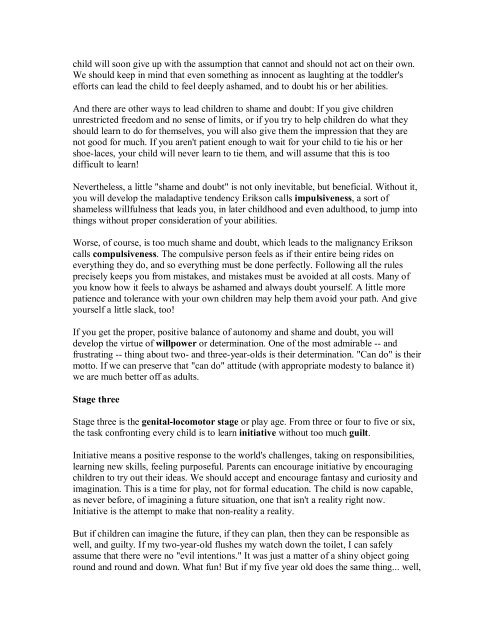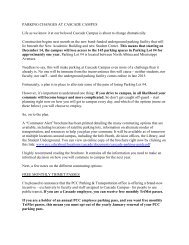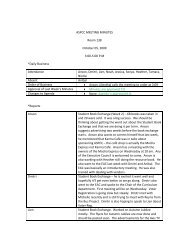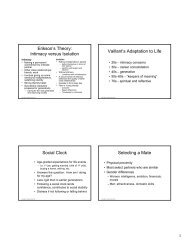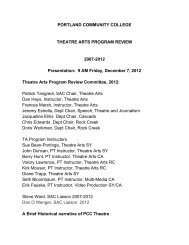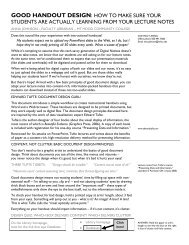erik erikson - pcc - Portland Community College
erik erikson - pcc - Portland Community College
erik erikson - pcc - Portland Community College
Create successful ePaper yourself
Turn your PDF publications into a flip-book with our unique Google optimized e-Paper software.
child will soon give up with the assumption that cannot and should not act on their own.<br />
We should keep in mind that even something as innocent as laughting at the toddler's<br />
efforts can lead the child to feel deeply ashamed, and to doubt his or her abilities.<br />
And there are other ways to lead children to shame and doubt: If you give children<br />
unrestricted freedom and no sense of limits, or if you try to help children do what they<br />
should learn to do for themselves, you will also give them the impression that they are<br />
not good for much. If you aren't patient enough to wait for your child to tie his or her<br />
shoe-laces, your child will never learn to tie them, and will assume that this is too<br />
difficult to learn!<br />
Nevertheless, a little "shame and doubt" is not only inevitable, but beneficial. Without it,<br />
you will develop the maladaptive tendency Erikson calls impulsiveness, a sort of<br />
shameless willfulness that leads you, in later childhood and even adulthood, to jump into<br />
things without proper consideration of your abilities.<br />
Worse, of course, is too much shame and doubt, which leads to the malignancy Erikson<br />
calls compulsiveness. The compulsive person feels as if their entire being rides on<br />
everything they do, and so everything must be done perfectly. Following all the rules<br />
precisely keeps you from mistakes, and mistakes must be avoided at all costs. Many of<br />
you know how it feels to always be ashamed and always doubt yourself. A little more<br />
patience and tolerance with your own children may help them avoid your path. And give<br />
yourself a little slack, too!<br />
If you get the proper, positive balance of autonomy and shame and doubt, you will<br />
develop the virtue of willpower or determination. One of the most admirable -- and<br />
frustrating -- thing about two- and three-year-olds is their determination. "Can do" is their<br />
motto. If we can preserve that "can do" attitude (with appropriate modesty to balance it)<br />
we are much better off as adults.<br />
Stage three<br />
Stage three is the genital-locomotor stage or play age. From three or four to five or six,<br />
the task confronting every child is to learn initiative without too much guilt.<br />
Initiative means a positive response to the world's challenges, taking on responsibilities,<br />
learning new skills, feeling purposeful. Parents can encourage initiative by encouraging<br />
children to try out their ideas. We should accept and encourage fantasy and curiosity and<br />
imagination. This is a time for play, not for formal education. The child is now capable,<br />
as never before, of imagining a future situation, one that isn't a reality right now.<br />
Initiative is the attempt to make that non-reality a reality.<br />
But if children can imagine the future, if they can plan, then they can be responsible as<br />
well, and guilty. If my two-year-old flushes my watch down the toilet, I can safely<br />
assume that there were no "evil intentions." It was just a matter of a shiny object going<br />
round and round and down. What fun! But if my five year old does the same thing... well,


